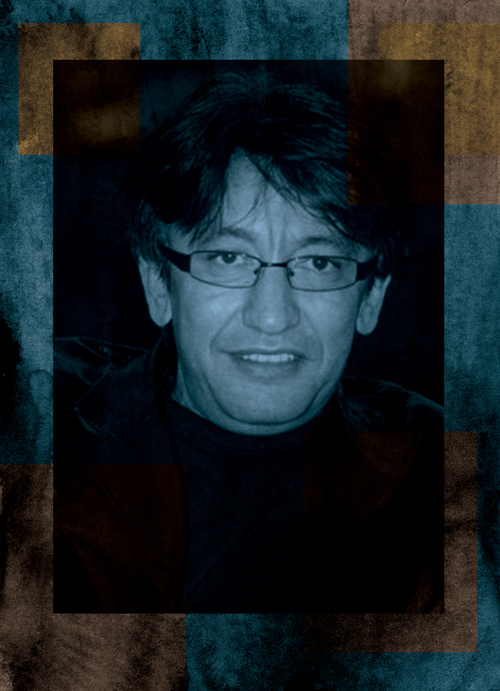Daoud Naji, a graduate of Persian language and literature from Balkh University, previously taught as an Assistant Professor at his alma mater. With the arrival of the Taliban, he migrated to Pakistan. He is now living and working as a journalist in London, where he is in charge of Afghanistan for the BBC’s Persian Service.
Have your rights ever been violated?
To be a university professor, to love your job and to wish from the depths of your heart to continue, to have great aspirations for your future, but then to be forced to flee from a group that is undermining everything you treasure, to leave everything behind – your books, your house, your job – and to run away to the top of a mountain. To look behind you for a second and see that your entire city is lost in dust and smoke. And you do not even know if the side you are fleeing to is safe at all. What is that if not a violation of your rights?
I was in Kabul in 1999 and had arranged to meet a friend who was working in one of the UN offices. After our meeting, he brought me back to the city centre. I was looking for a car when a whip curled around my neck. I collapsed on the spot and was writhing in pain when somebody kicked me and said: “Get up! It is prayer time. Don’t you hear the call to prayers?”
I did not have the right to choose my clothing for many years, or decide for myself whether or not I wanted to shave – it was obligatory to grow a beard in those years. Even the right to be prepared for prayers and to talk to God was violated many times under the Taliban’s rule. I was forced many times to join the ranks of the prayers without having first completed my ablution and the necessary rituals.
What are the important achievements since the time of the Taliban in Afghanistan?
The first is the passage of the Constitution. In my view, despite its contradictions, the Constitution has opened the way towards the future and guaranteed freedom of expression, freedom of the press, and of political parties.
Secondly: Communications. Mobile phones have made daily life very easy and changed behaviour. In particular, communications technology, and especially the internet, has helped to break down boasting based on ignorance. Previously if somebody with a big belly and the right appearance said that, for example, Brazil was an island next to China, he was likely to be believed, and even to be quoted. Now, if somebody has doubts, they will take out their smart phone and check the truth of the statement.
Third: significant events in the field of sports. With the first Olympic bronze medal in Beijing, Afghans had their first taste of being a part of the world in practice. When Afghanistan’s national football team came first in south Asia, Afghans danced all over the world and realised just how limp their bodies had become under all those years of banning.
What do you fear most today?
I fear the politicisation inherent in the structure of the security forces. This was planned in the Bonn conference. The foundations were quite good and modern, but many aspects were missing because it was designed on an emergency basis. These gaps have now come to light after a decade. The structure of the army and the police is too political: they are under the influence and at the mercy of all political events in Afghanistan.
What are the biggest challenges facing Afghanistan?
Many things have happened in Afghanistan in the past few years that indicate a deep and repeated cultural rupture between various spectra in the country. We have seen numerous cases of polarisation and strong opposition on specific issues between groups, on questions such as the Elimination of Violence Against Women Law or the linguistic conflict beween Dari and Pashto on naming institutions, such as the university. Both linguistic groups are sizeable in numbers, and the divide between them widens day by day. I believe that a number of people have been left behind in the societal transition in Afghanistan, and these people cannot be ignored. This is a great challenge.
Employment is another major challenge. Afghanistan will soon have a generation of young people with university degrees. They have expectations; they want their life to change – and these are demands they will place on the government. They want good jobs.
Finally, there is also the issue of the politicisation of the security forces, which I already mentioned.
Which factors deter women from participating in social, economic, political and cultural spheres?
The high rates of illiteracy amongst women have devastating impacts for women’s participation. A large proportion of Afghan women are illiterate because of the historical oppression they have endured. The traditional mentality is another barrier to their participation. And finally, the project-based, short-term way of thinking that predominates. The vast majority of the mechanisms offered by the government, the international institutions or women themselves in the past decade, even when they have been useful, have usually been temporary and superficial interventions.
“Unveiling Afghanistan, the Unheard Voices of Progress” is a campaign by Armanshahr and FIDH, which explores views held by Afghan civil society actors. Over 50 days, 50 influential social, political, and cultural actors hope to spark conversation and debate about building a society that is inclusive of women’s and human rights in Afghanistan.
Follow 50 interviews drawn from the “Unveiling Afghanistan campaign” daily on the Huffington Post. Follow Unveiling Afghanistan on FIDH Twitter: www.twitter.com/fidh_en


